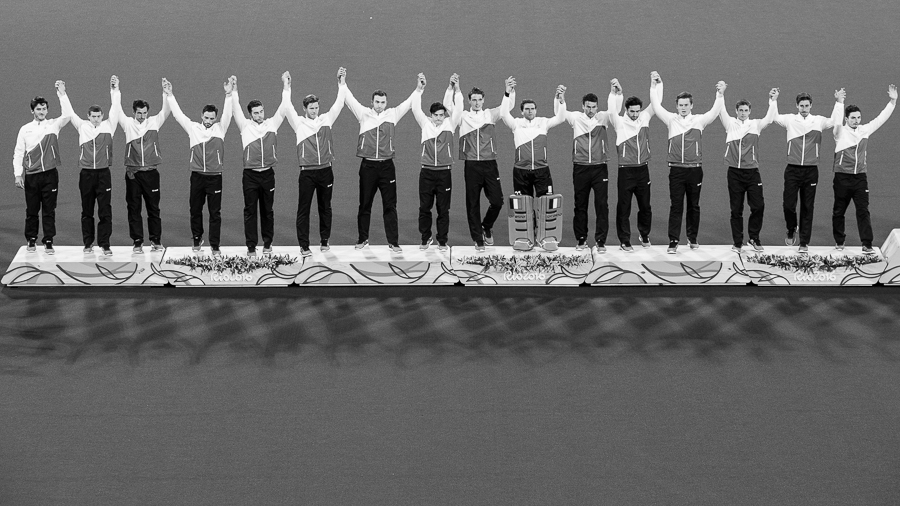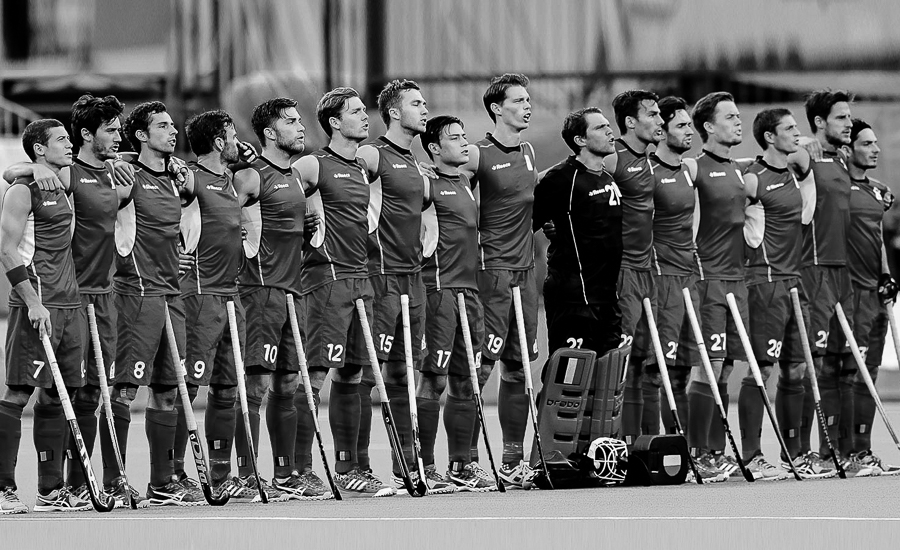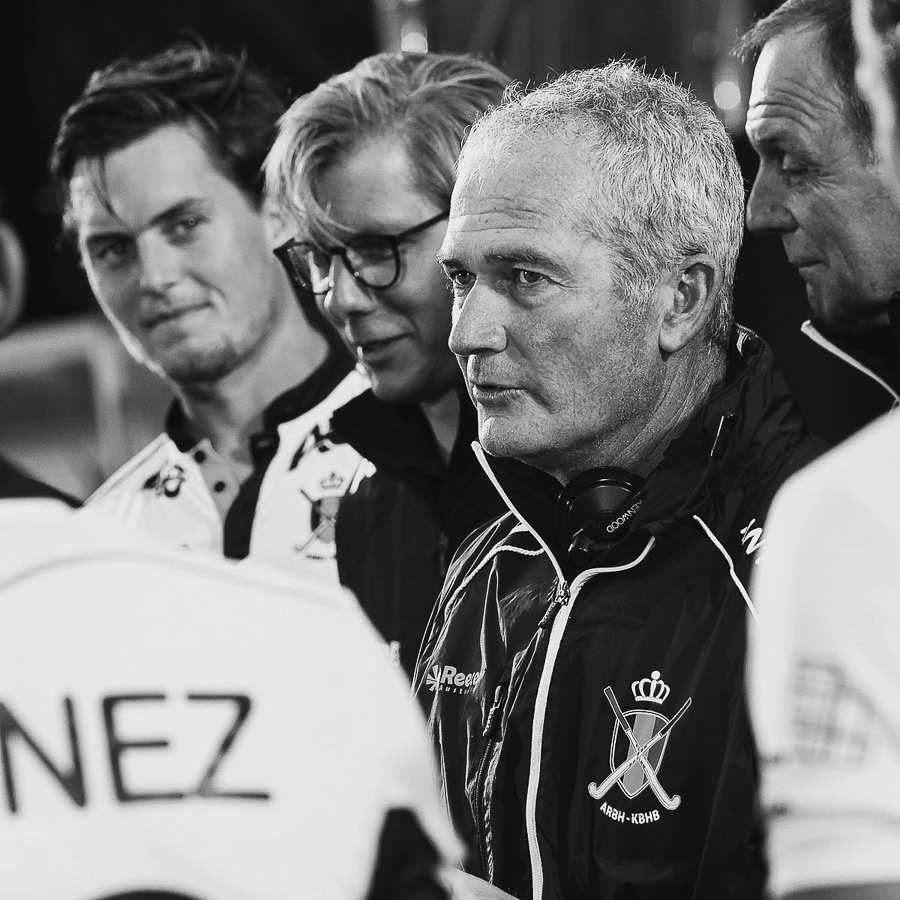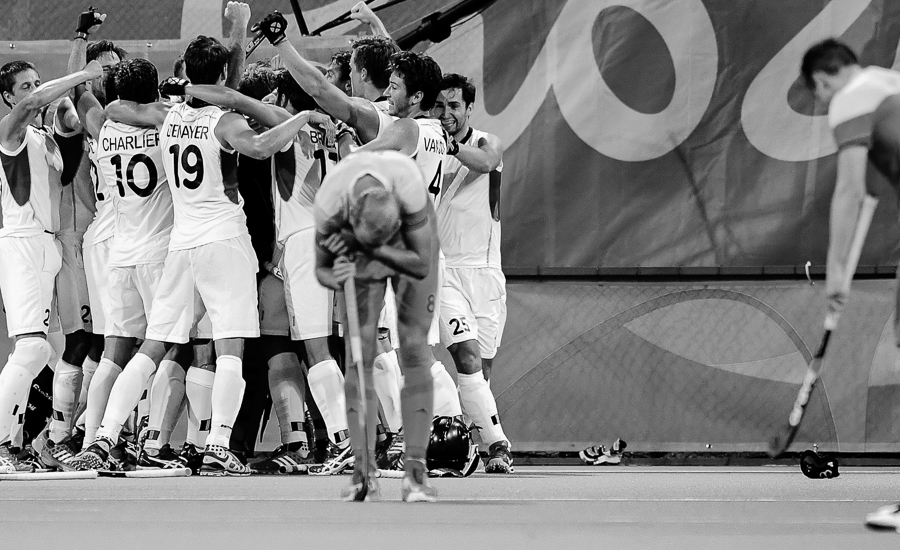The beginning
Loïck Luypaert is a Red Lion, and has been the proud owner of a silver Olympic medal since the 2016 Games in Rio de Janeiro. That silver medal was one of the highlights for Team Belgium, and in particular for hockey in Belgium at the national level, which has been on the rise for some time. We all remember the a cappella rendition of the Belgian national anthem. That moment became symbolic for the Red Lions’ entire Olympic Games. “Our team spirit was our biggest asset for sure”, says one half of the defensive tandem that has been propelling the Red Lions forward for years now. Loïck Luypaert is articulate and down to earth, but more than anything, full of ambition, to a non-Belgian-like extent. An Atticus athlete who is always looking towards the future.
“In professional sports, the future is all that matters. The next game, the next training session, the next prep season, the next tournament. The next step to more, to better. Looking back today on the road the Red Lions have travelled, I have to say ‘well done’ to everyone involved. We took the right steps, and made the most, athletically speaking, of relatively limited means. (grinds teeth) Except for the gold medal, of course… The key question right now is how we can improve in the following years. Our talent and our athletic knowhow alone will not be enough to keep us playing at the top world level.
The seed
“But let us look back on the initial seed of our success in hockey. This seed was sown by many different people and organisations. I’m not going to go back to the very start, when the hockey federation was first founded, although that is in itself a story that appeals to the imagination, of a few men gathered around a table whom started working towards a shared dream with no means whatsoever. Instead, I will focus on the Red Lions. The foundation for the Lions was laid with the 87-88 generation of players. Chris Vercammen and his entourage saw the potential of boys like Van Strijdonck, Charlier, Vanash, Briels, Truyens, Dohmen, etc. Those boys were fourteen years old when they were first put together and went through intensive preparation for the U16 European championship, and became the European champion in 2003. That group was hugely talented. Looking at the names of that champion team, they include some of the driving forces behind the current Red Lions. That is when it all started.”
Chemistry and talent development
“Those boys already knew one another really well, and then along came my generation, the boys of 90-91. Gougnard, Van Aubel, Boccard, Cosyns, and me, that is. Our first gold medal was at the U18, here in Belgium. Our team never lost a single game. Later on, Boon, Denayer, and Dockier were added. We moved up the ladder quite quickly; we came in second at the European championship in Poland. After that championship, the federation made a smart move. They combined these two generations, and something magical happened. Chemistry, I guess. We were an obsessed group of youngsters, always occupied with hockey, always together. That was when the decision was made to start working on a long-term strategy that looked beyond just the next day, the next game. The end goal was to be the world championships in London and the 2016 Olympic Games.”
In the meantime, BOIC had initiated the Be Gold project, offering customised training for the most talented newcomers. Van Doren and Stockbroeckx were a part of that group. They received technical training, did strength training, and even received psychological support. That kind of unadulterated talent development is where the future lies; it results in players with a more complete skill set. Those two are wonderful for the fans to look at.”
The first goal
“Thus, the athletic foundation was laid. After the world championship in London where the Red Lions came in fifth, the true potential of our group became apparent. Everyone became more ambitious. But greater means were necessary for the next step, the top tier of the podium at Rio. Luckily, a clever commercial partner joined the team just in time. They understood that hockey is a gentleman’s game, based on fair play. This aligned really well with their values, and the partnership had the potential to strengthen their brand. Suddenly, a bunch of communication campaigns got off the ground, and the team became a kind of brand, became more visible. The marketing was just right.”
“We began living as professional athletes. Dutchman Marc Lammers was key in that, in every way. He taught us that hockey is a way of life. No drinking, no smoking, no funny business. His motto was: ‘Every choice you make, you make as a professional athlete.’ Do I have pasta or a hamburger for dinner? Do I have water or get a pint? Do I stick around after practice or head straight home? These small temptations in life are ones that you have to resist if you want to be a world-class professional athlete. Marc was very strict about these things, and rightly so.”
“Really impactful decisions were starting to be made. More time spent practising, more time spent working out, and more than anything, a more strict selection process. Marc was brave enough to choose Van Doren and me as the main duo for the Red Lions, even though we were the youngest defensive duo! The reason was a game we played together, facing KHC Dragon. We did great, and Marc recognised that. Nowadays, Arthur and I complement each other really well, in all aspects. He is more intuitive and technical, whereas I am better in terms of strength, positioning, and passing. Together, we always manage to find a solution. And besides, it is a true pleasure to play alongside Van Doren. I think he is simply the best player in the world for that position.”
The most valuable player is the team
“After Lammers, Jeroen Delmee came along, because our results had to improve. Delmee was Dutch too, and very good tactically. He was amazing, really knew the sport, and his explanations were always very clear. But the chemistry with the group was off. There was no cohesion, and we needed cohesion if we wanted to be able to move forward. Delmee recognised that he would not be able to solve this issue and decided to step down on his own. That takes some doing, and deserves respect.”
“And so, 10 months before Rio, we met the New-Zealand coach everyone knows and loves today, Shane McLeod. His communication skills and charm impressed us from day one. His message for the whole team was clear: ‘I don’t want a team of stars, but a star team.’ He taught us that in team sports and especially among analysts and those who romanticise those sports, a misconception persists regarding working with so-called star players. Teams are not built around star players; instead, you try to fit them neatly into a team. That was quite the eye opener, particularly for those players who considered themselves to be less important. McLeod made sure everyone was equally important, and that goes a long way. He would always say things like, ‘I want to push to the podium. I want utilise every individual to their maximum potential.’ That team-based approach was like a breath of fresh air. We began realising that we all needed one another, and that together, we would be able to form an invincible front.”
“Of course that is more easily said than done. We really had to flip a switch. We started talking to one another during workshops. I am so sick of that word, ‘workshop’, but wow, it really worked! We were allowed to discuss anything and everything. After a while, we were all able to criticise or praise one another without it being an issue. In a group that consists of strong personalities, that is so crucial! Suddenly, we were a true group. We would go through fire and water for one another, and that really began to show. In fact, I would wager that this was our biggest asset in that Olympic semi-final against the Dutch team. We were the superior team, operating almost as a single organism. And our opponents, for all their individual skills, were already under a lot of pressure after mere minutes. They were powerless in the face of our collective front. We exuded a kind of invincible quality. Our opponents began trying to force it, playing as individuals; they simply did not know what to do with us. That was so cool. After that game, I told an interviewer that ‘the most valuable player today was the team as a whole’. That says it all, if you ask me.”
“We were the superior team, operating almost as a single organism. And our opponents, for all their individual skills, were already under a lot of pressure after mere minutes. They were powerless in the face of our collective front.”
Loïck Luypaert on Rio 2016 semi-finals against The Netherlands
“I hope our Red Devils will be able to say the same one day. I think that this is the thing they need to work on the most right now. There is plenty of individual talent in that generation, but now, they need to become a star team. If they can do that, believe me, the country will love them.”
“What’s next for Hockey in Belgium? Well, more than anything I hope that everyone will realise that we must not allow this athletic highlight to be the end of the road for us. We have to do with the next generation, the current youngsters, what was done with us, and preferably do it even better. We have paved the way and have lots of experience to share. In any case, everyone’s ambition must be to become regulars at the top world level, alongside countries like the Netherlands, Australia, and New-Zealand… Moreover, the time has come to make the Belgian club-level competition more attractive. To put it simply, we have to raise the bar. New fans will expect to see play at the level of the Red Lions, but we’re far from being able to achieve that. The Red Lions approach must be translated into the club level as well.”
“More funding also has to be provided for infrastructure and a professional approach, to allow us to attract even more talent into this beautiful sport. On top of that, a communicative vision and commercial strategy must be developed that will recruit potential partners and sponsors and retain them in the long term. Hockey is hot nowadays and is featured in the media a lot, but professionally speaking, it has only just gotten started.”
Entourage
“Finally, it is important for sport management agencies to start supporting hockey athletes more closely, as is already done for volleyball and football athletes. That is crucial, and I am speaking from experience. These agencies are able to fill in the gaps and do things for you that no one in your immediate environment has control over. Things like contractual and fiscal support, communication, and branding, but also specific physical and medical support. Each player has different needs, and clubs and even the federation itself are not always able to provide the solution, due to lack of time or means. For example, take the hacking incident I was recently involved in. My personal medical data was up for grabs on the Internet, and was misrepresented in the media. That is a scary thing for anyone. However, a single phone call to my agent with Atticus Sports was all that was needed. The Atticus experts, whom I work with all the time, helped me stay calm in that moment. In a matter of hours, we were able to turn a crisis into a positive story for myself and for the sport of hockey as a whole. WADA (the World Anti-Doping Agency) even used our communication and approach. Moments like that make you realise that you really need an entourage like that. Otherwise, you’d be left lagging behind events.”
